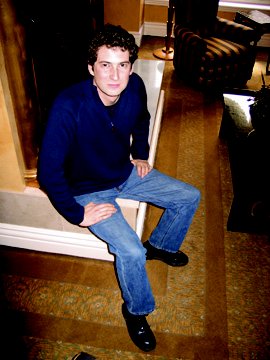Excerpts from the interviews:
“Writing was always something I liked doing in school, and it sort of seeped into my free time -- during Christmas and summers, I was writing, and the stories kept getting longer and longer. When I was about 12, I wanted to write a Star Wars-type epic, so I embarked on a story I never finished. Then I wrote a lot of Dungeons & Dragons-type stories which basically fictionalized games I'd been playing with my friends.
“Roald Dahl was a big influence on me, for a number of reasons. For one, the books are just so much fun! They can be very cruel, but kids are cruel at times. It's a much more simple, extreme world for kids: justice and retribution. In my day at least, kids felt more put upon, and Dahl was always on their side. That was so invigorating and empowering for them to read -- they could make things happen, and thwart those evil adults!
“In my summer holidays when I was 14, I started a story about a boy who was addicted to video games. I sent it to a bunch of publishers in Canada. They all rejected it but some were encouraging, so I rewrote it the next summer when I was 15. Then I had my big lucky break. I sent it to Roald Dahl, who's a friend of a family friend. He gave it to his literary agent, they liked it, and they sold it in Canada, the US, and Britain. That was my first book, Colin's Fantastic Video Adventure. It was huge for me, and I was insufferable. I was loathsome! Couldn't talk about anything else to my friends at school. Ironically, that book was me trying to write like Roald Dahl, because he was my hero, and it's unlike anything I've written since.”
*
 “I never start out having a burning issue. My books always start with a story, a setting or an event, then 'Who's going to make this story happen?' Any themes that emerge develop naturally. In the Silverwing books they emerge from the very nature of the bat creatures, and the experiences they're having. I did research into bats and all these different origin myths, and it seemed like a natural springboard into different histories, mythologies, and even religions, with this young person trying to figure out 'Which version of my history is correct?' To me they became stories about the impossibility of knowing the truth, of finding one definitive myth or history or story. The bats have all these different creation myths about why they came to be of the night, how they were banished; and the birds have different theories, and the beasts have different theories. I found that interesting from any point of view: historical, political, religious.”
“I never start out having a burning issue. My books always start with a story, a setting or an event, then 'Who's going to make this story happen?' Any themes that emerge develop naturally. In the Silverwing books they emerge from the very nature of the bat creatures, and the experiences they're having. I did research into bats and all these different origin myths, and it seemed like a natural springboard into different histories, mythologies, and even religions, with this young person trying to figure out 'Which version of my history is correct?' To me they became stories about the impossibility of knowing the truth, of finding one definitive myth or history or story. The bats have all these different creation myths about why they came to be of the night, how they were banished; and the birds have different theories, and the beasts have different theories. I found that interesting from any point of view: historical, political, religious.”
*
 “When I finished Airborn I was actually worried. The book was pure adrenaline, pure adventure, and I'm somewhat puritanical when I look at stories. I asked myself, 'What's it about? What does it do? Am I somehow nourished or enlightened at the end?' That's a stupid way to look at art, a lot of the time, but I still think that way. The Silverwing books had all sorts of themes about religion and life and death, metaphysical things, but Airborn didn't. It seemed very uncomplicated and I thought, 'Even if it's popular it will never win an award.' To me it was a really important book, because a lot of personal stuff got worked into it. And writing it made me feel good, really happy, in a way the other books hadn't.”
“When I finished Airborn I was actually worried. The book was pure adrenaline, pure adventure, and I'm somewhat puritanical when I look at stories. I asked myself, 'What's it about? What does it do? Am I somehow nourished or enlightened at the end?' That's a stupid way to look at art, a lot of the time, but I still think that way. The Silverwing books had all sorts of themes about religion and life and death, metaphysical things, but Airborn didn't. It seemed very uncomplicated and I thought, 'Even if it's popular it will never win an award.' To me it was a really important book, because a lot of personal stuff got worked into it. And writing it made me feel good, really happy, in a way the other books hadn't.”
“I'd always hated it when writers told me, 'These characters, they're writing the book themselves.' I thought they were such big liars! But then it happened to me. That was one of the reasons I did a second book, that and the world. I liked the alternative, pseudo-Victorian technology, and it just seemed like there's so much potential in this world for more adventures, different destinations and creatures to explore.”



